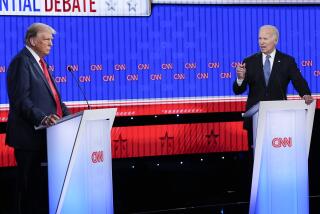U.S. Details Warming Threat but Defends Its Policy
- Share via
WASHINGTON — The Bush administration Monday described in its starkest terms the potentially serious consequences of global warming, but it did not call for any stronger efforts to combat the problem than those it has already proposed.
The report, submitted to the United Nations, stated that the climate changes of recent decades “are likely due mostly to human activities.” But it projected that the United States, already the world’s biggest producer of greenhouse gases, would emit 43% more of such gases in 2020 than in 2000.
Earlier this year, President Bush outlined a policy to prod businesses to reduce greenhouse gas emissions voluntarily. That approach, he said, would slow the growth without damaging the economy. Requiring businesses to reduce greenhouse gas emissions, he said, would hurt the nation’s economy.
Experts said Monday’s report revealed a glaring mismatch between the administration’s own estimate of the scale of the problem and the president’s efforts to deal with it.
“I do see a disconnect; there has to be more of an action plan,” said UC Irvine Chancellor Ralph J. Cicerone, who headed a recent National Academy of Sciences panel on climate change.
But instead of outlining new goals, the administration defended its current policy in the report, which was required as part of the 1992 U.N. Framework Convention on Climate Change, signed by the president’s father.
“What strikes me about this report is that it says that the climate is changing, it’s going to have a serious impact on the United States and here’s my way of dealing with it: Do nothing,” said Eileen Claussen, director of the Pew Center on Global Climate Change, which works with businesses to reduce greenhouse gas emissions. “It is quite amazing.”
White House officials disputed the notion that the Bush administration’s policy did not jibe with their interpretation of the problem.
“We have always said that climate change is a serious issue,” said White House spokesman Scott McClellan. “That’s why the president has a plan to address it; that’s why we’re investing $4.5 billion in the fiscal 2003 budget.”
Much of that money will pay for research that will help the administration better understand the challenges ahead.
“It’s not a sudden revelation here and it’s not a new policy of any kind,” said Joe Martyak, Environmental Protection Agency spokesman. “We’ve always known that man contributed. But there’s a lot of uncertainty about just how much comes from the human contributions.”
The report was released on the same day that all 15 European Union nations ratified the Kyoto treaty, in which about 40 countries agreed to reduce greenhouse gas emissions by an average of 5.2% below 1990 levels. Several other countries, including Japan, Russia and Canada, are expected to follow suit soon.
Bush pulled the United States out of that treaty early last year and, reversing a campaign promise, rejected a plan to regulate emissions of carbon dioxide from power plants. Scientists believe that carbon dioxide is the major contributor to global warming from human activities, and 40% of the U.S. carbon dioxide emissions come from power plants.
One of the reasons Bush cited for rejecting that accord was that it did not require developing nations to commit to emission reductions. But Cicerone said the White House could more easily lead the developing countries to make smart decisions about the future if it adopted a more aggressive policy of its own.
“This is not easy,” Cicerone said. “I do not want to ridicule the White House or any other group. But we do have to convince the White House to take bigger steps....”
More to Read
Sign up for Essential California
The most important California stories and recommendations in your inbox every morning.
You may occasionally receive promotional content from the Los Angeles Times.













